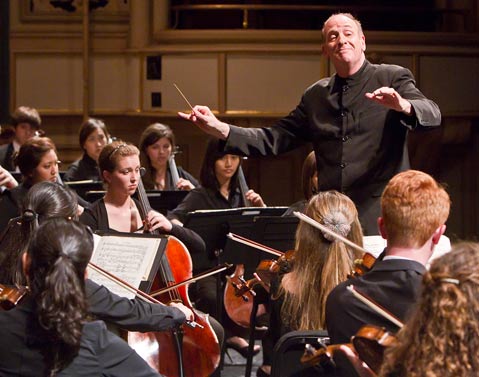Academy Festival Orchestra at the Granada
Music Academy of the West’s Orchestral Season Opening Concert

Every season, conductor Larry Rachleff arrives at the Music Academy of the West ready to perform a magic act. He takes a group of talented young musicians, all of them excited and most somewhat out of their element, and, in the space of one jam-packed week of rehearsals, forges them into a fully functioning symphony orchestra. No matter how many times one has seen Rachleff pull it off, this musical spectacle retains the power to amaze. This year I happened to attend a few minutes of one of the early rehearsals, a privilege ordinarily only accorded to members of the Music Academy’s inner circle of benefactors, and the giddy sense of adventure and camaraderie were contagious. Still, the pace at which Rachleff proceeded in rehearsal, carefully going over only a few bars of Richard Strauss’s difficult tone poem Till Eulenspiegel in the course of the 15 or so minutes I spent in the back of Hahn Hall, left me wondering: Can they get there in time?
Never fear—things were very much in order at the Granada this past Saturday night, when the Academy Festival Orchestra hit the stage. Rachleff was extremely animated, his energetic, forceful motions coaxing all kinds of exotic sounds out of the ensemble. Strauss’s version of the German legend is known as Till Eulenspiegels lustige Streiche, Op. 28, and it requires both strong efforts on the part of the horn player and the clarinet in stating the merry prankster’s themes, and quick reflexes from the entire orchestra, which must negotiate some rapid changes in the service of what amounts to an opera’s worth of activity condensed into 17 minutes of instrumental music. Fortunately, the Academy fellows were very much up to the challenge, and Till’s joking, wheedling, laughter, and final wailing, distorted lament from the gallows were all rendered with clarity and gusto.
After the intermission, the first notes heard were from the unforgettable opening of the Symphony No. 1 of Johannes Brahms. For those fortunate enough to have attended both concerts, they recalled the bravura performance of the same work by the Los Angeles Philharmonic under the baton of Gustavo Dudamel in the Granada in early May. Where the Los Angeles Philharmonic emphasized the complex and brooding dissonance under the surface of this majestic work, Rachleff and the Academy Festival Orchestra dwelt more on the surging elasticity of the massed strings and their multiple musical collisions with the percussion section. What a fabulous opportunity the Granada offers for the exploration and comparison of more than one version of these masterworks of the orchestral repertoire. Add the presence of the Santa Barbara Symphony to the mix, and between CAMA’s International Series, the Academy Festival Orchestra, and Nir Kabaretti’s S.B. Symphony, the Granada has one of the most formidable rotations of great orchestras anywhere.
The sound of the Academy Festival Orchestra as yet may lack some of the brilliance of the Los Angeles Philharmonic, and these young musicians are not yet the equals of their counterparts in the Santa Barbara Symphony, yet Larry Rachleff coaxed from them an entirely creditable and listenable version of the Brahms, replete with the tension and release that marks this singularly effective revision of Beethoven’s mature symphonic style. Given a few more weeks, and with another renowned conductor, Peter Oundjian, at the helm for the Symphony No. 5 in C-sharp Minor of Gustav Mahler, who knows what they may achieve.



